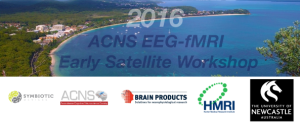
Location:
HMRI/ University of Newcastle, NSW, AUSTRALIA
Dates:
20th – 22nd November 2016
Scope:
Concurrent EEG-fMRI can:
· overcome the inherit sensitivity limitations of both EEG and fMRI
· enable the investigation of underlying mechanisms and cortical development
· assist with identification of generators and mapping of the cortical network and cognitive function,
With applications in the fields of epilepsy research, anaesthesiology, pain research and in the greater areas of cognitive science and neuroscience. However, technical and methodological challenges regarding acquisition of good quality data and subject safety can preclude the use of concurrent EEG-fMRI.
This Symposium and workshop aim to provide theoretical and practical training about deriving EEG in the MR environment, and to offer ideas about how concurrent EEG-fMRI can be used to answer scientific and clinical questions.
Organisers: Bryan Paton (University of Newcastle), Vinh Nguyen (QIMR Berghofer), Agnieszka Iwasiw (Symbiotic Devices AUST & NZ) and Brain Products GmbH, Germany
EEG-fMRI Symposium
Speakers
Dr. Vinh Nguyen, Research officer,
QIMR Berghofer
Dr. Nguyen was awarded a PhD degree of Computational Neuroscience at Queensland Brain Institute, The University of Queensland in 2014 under the supervision of A. Prof Ross Cunnington and Prof. Michael Breakspear. The PhD project examined neural responses across modalities with a focus on the integration of EEG and fMRI to inform brain functions of 1) the visual system during face perception, and 2) the motor system during the preparation of voluntary actions.
Dr. Nguyen is currently a postdoc research scientist in the System Neuroscience Group at QIMR Berghofer Medical Research Institute working under the lab of Dr. Christine Guo. His recent work involves the use of neuroimaging and physiological recordings to study brain functions during naturalistic experiment paradigms (i.e. movie and music viewing), and the breakdown of those brain functions in patients with mental illnesses.
Dr Suresh Muthukumaraswamy, Rutherford Discovery / Senior Research Fellow
Schools of Pharmacy and Psychology, University of Auckland
Suresh completed his PhD in psychology at the University of Auckland in 2005 after which he joined the newly established Cardiff University Brain Research Imaging Centre as a post-doctoral fellow. In 2014 Suresh received a Rutherford Discovery Fellowship and has returned to Auckland where he works in both the School of Pharmacy (Medicine) and School of Psychology (Science). Suresh’s main research interests are in understanding how drugs alter brain activity and in developing methodologies to measure these changes in both healthy individuals and patient groups. His studies have involved a range of compounds including hallucinogens (ketamine, LSD, psilocybin), anaesthetics (propofol, dexmedetomidine), anti-epileptics (vigabatrin, perampanel, tiagabine) and GABA-enhancers (benzodiazepines, zolpidem, gaboxadol). Suresh’s research has used a wide-range of neuroimaging techniques including magnetoencephalography, electroencephalography, functional magnetic resonance imaging and magnetic resonance spectroscopy. Since returning to Auckland his research group have been using simultaneous EEG/fMRI to measure drug action in the brain.
Mr Aaron Warren,
Florey Department of Neuroscience and Mental Health Department, UK
Aaron is currently a third year PhD student in the Department of Medicine (Austin Health)/Florey Institute of Neuroscience and Mental Health at the University of Melbourne, under the supervision of Dr John Archer, Dr David Abbott, and Prof Graeme Jackson. His PhD focuses on applying EEG-fMRI techniques to identify markers of neural network dysfunction in children with Lennox-Gastaut syndrome, a severe epilepsy phenotype associated with intractable seizures and cognitive regression (‘epileptic encephalopathy’).
Dr David Carmichael, Reader in Neuroimaging and Biophysics
UCL Institute of Child Health
David Carmichael is an MRI Physicist who following a PhD in medical physics at UCL (2000-2004) has worked on using new combinations of imaging techniques to measure and understand the human brain across spatial and temporal scales. His main focus over the last few years has been on combined measurements of electrophysiology via EEG and functional MRI and quantitative structural MRI. In particular he has worked on technical advances such as the combination of intracranial EEG with fMRI in humans and the development of motion insensitive EEG-fMRI. He is also engaged in a program of work in the application of these methods to study of children with epilepsy who are treated at Great Ormond Street Hospital. EEG-fMRI is important in this context by allowing the non-invasive identification and characterisation of epileptogenic brain networks.
EEG-fMRI Symposium Program
When: 1pm, 20th November 2016
Location: University of Newcastle
Format 45-60 min talks
EEG-fMRI Workshop
Speakers
Nicola Soldati, PhD, Brain Products GmbH
Dr Vinh Nguyen, QIMR Berghofer
Agnieszka Iwasiw, Symbiotic Devices
For program and further information
Register Now for the ACNS EEG-fMRI Early Satellite Workshop.
For online payments please click here.

